九年级英语下册Module2EducationUnit3Languageinuse同步练习无答案外研版
外研版九年级英语下册Module 2 Education Unit 3 Language in u

Module 2 Education Unit 3 Language in use【学习目标】知识目标:能默写本模块重要单词和短语能力目标:能读懂文章内容并能完成相关习题。
情感目标:通过学习学校生活,能描述自己的学校生活。
【重点难点】1、能读懂文章内容并能完成相关习题。
2、能掌握代词和介词的用法。
【学习步骤】环节一:夯实基础,巩固落实1. one, it, that 用来指代前面出现过的名词的区别。
1. There is a photo on the wall, it was taken by Tony.2. Lily likes cartoon films, while Lucy likes funny ones.3. The population in China is larger than that in India.通过观察上面的三个例句我们可以看出,it指________________________。
One 指__________________________。
That 指____________________________。
2. another,other,the other,others,the others 用法的区别。
another 用来泛指其他的任意一个事物。
other 用来泛指其他的任意一些事物。
the other 用来特指另一个或另外的所有事物。
一般如果当我们没有提前给出范围时用________,而如果提前给出了范围则用________。
如果我们将他们所修饰的名词省略掉则用_______ 或_________。
请用上面的词完成下面的句子。
1. I have two sons, one is eleven, _________ is thirteen.2. This kind of sandwich is quite delicious, could I have ________ one?3. Some students like watching films, ________ like playing sports.3. both, either, neither, all, noneBoth 指_______________, either 指________________, neither指________________。
Module2EducationUnit3Languageinuse课件英语九年级下册

C
one
【解析】句意:——我能预订一张周五的票吗?——对不起,我们一张也没有了。周六的怎么样?由空前的"Sorry"及空后的"How about one for Saturday?"可知,周五的票没有了,故排除A、D两项;no one指人,none既可指人又可指物,空处指物。故选C。
Module Education Unit 3 Language in use
教材语境 How did your exams go last term?你上学期考试考得怎么样? (教材P14)
go v.(事情)进展,进行
go在此作不及物动词,常与疑问词how连用。
neither pron. 两者都不
neither在此作代词,其反义词为both"两者都"。neither可以单独使用,也可以与of短语连用;"neither of+复数名词或代词"作主语时,谓语动词用单复数形式均可。
Neither of them was/were in good health,but both worked very hard. 他们两个身体都不好,但工作都很努力。
教材语境 Students may join as many clubs as they like, but they must join at least one. 学生们可根据他们的喜好加入多个俱乐部,但是他们必须至少加入一个。(教材P16)
join v. 加入,成为……的一员
精品2019九年级英语下册 Module 2 Education Unit 3 Language in use教案 (新版)外研版
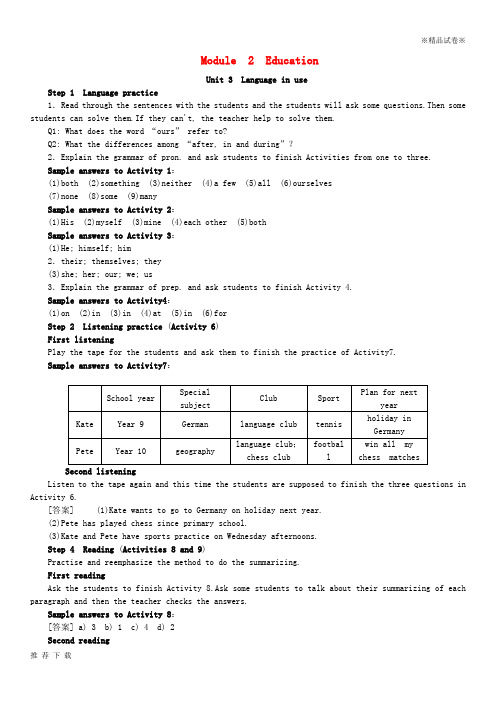
Module 2 EducationUnit 3Language in useStep 1Language practice1.Read through the sentences with the students and the students will ask some questions.Then some students can solve them.If they can't, the teacher help to solve them.Q1: What does the w ord “ours” refer to?Q2: What the differences among “after, in and during”?2.Explain the grammar of pron. and ask students to finish Activities from one to three.Sample answers to Activity 1:(1)both (2)something (3)neither (4)a few (5)all (6)ourselves(7)none (8)some (9)manySample answers to Activity 2:(1)His (2)myself (3)mine (4)each other (5)bothSample answers to Activity 3:(1)He; himself; him2.their; themselves; they(3)she; her; our; we; us3.Explain the grammar of prep. and ask students to finish Activity 4.Sample answers to Activity4:(1)on (2)in (3)in (4)at (5)in (6)forStep 2Listening practice (Activity 6)First listeningPlay the tape for the students and ask them to finish the practice of Activity7.Sample answers to Activity7:Second listeningListen to the tape again and this time the students are supposed to finish the three questions in Activity 6.[答案] (1)Kate wants to go to Germany on holiday next year.(2)Pete has played chess since primary school.(3)Kate and Pete have sports practice on Wednesday afternoons.Step 4Reading (Activities 8 and 9)Practise and reemphasize the method to do the summarizing.First readingAsk the students to finish Activity 8.Ask some students to talk about their summarizing of each paragraph and then the teacher checks the answers.Sample answers to Activity 8:[答案] a) 3 b) 1 c) 4 d) 2Second readingRead the passage again and check the true sentences. (√)Sample answers to Activity 9:1.√ 4.√Step 5Around the worldT: Can you imagine the schools without teachers in the future? Maybe it will come true sooner or later. Let's look at the research studied by Professor Mitra.Step 6Homework1.Ask the students to think about their opinions on their present school lives and what they want in their school lives and so on.2.Finish the exercises of this module.Blackboard design寄宿学校的校规There are over 800 boarding(寄宿) schools in the UK with students from home and foreign countries. Boarding schools started hundreds of years ago in the country. But the earliest boarding schools were set up for white, rich boys only. Now both boys and girls can go to boarding schools from the age of 7 to 18.In the UK, boarding schools have three terms in a school year, with about 13 weeks in each term. Students study and live together. They can't go outside if they are not allowed to. In some schools, each student has his or her subject plan. Besides the usual classrooms and labs, the boarding schools have lots of other facilities for their students, including music rooms, boats,swimming pools, cinemas and theaters. Most boarding schools have a “light out” time. So when it's time to go to bed, all the lights in the bedrooms are turned off. There are housemasters to take care of stude nts all the time,especially afterschool hours.Nearly all students at boarding schools wear a school uniform. Boys usually wear a shirt and a tie, and girls wear a white blouse, sometimes also a tie and a skirt. As students get older, the rules become less strict.In the UK, boarding schools provide students with delicious food. They can choose to have a full English breakfast or simply bread. For lunch and supper, they can choose a meal with or without meat. And there is always selfservice for salad and dessert. Students can also make themselves something to eat at any time in a kitchen, or drink tea or have a snack between meals.。
【K12教育学习资料】九年级英语下册Module2EducationUnit3Languageinu
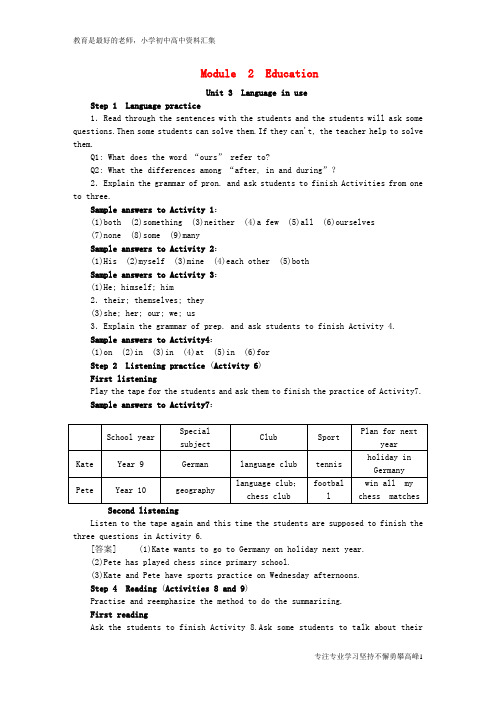
Module 2 EducationUnit 3Language in useStep 1Language practice1.Read through the sentences with the students and the students will ask some questions.Then some students can solve them.If they can't, the teacher help to solve them.Q1: What does the word “ours” refer to?Q2: What the differences among “after, in and during”?2.Explain the grammar of pron. and ask students to finish Activities from one to three.Sample answers to Activity 1:(1)both (2)something (3)neither (4)a few (5)all (6)ourselves(7)none (8)some (9)manySample answers to Activity 2:(1)His (2)myself (3)mine (4)each other (5)bothSample answers to Activity 3:(1)He; himself; him2.their; themselves; they(3)she; her; our; we; us3.Explain the grammar of prep. and ask students to finish Activity 4.Sample answers to Activity4:(1)on (2)in (3)in (4)at (5)in (6)forStep 2Listening practice (Activity 6)First listeningPlay the tape for the students and ask them to finish the practice of Activity7.Sample answers to Activity7:Listen to the tape again and this time the students are supposed to finish the three questions in Activity 6.[答案] (1)Kate wants to go to Germany on holiday next year.(2)Pete has played chess since primary school.(3)Kate and Pete have sports practice on Wednesday afternoons.Step 4Reading (Activities 8 and 9)Practise and reemphasize the method to do the summarizing.First readingAsk the students to finish Activity 8.Ask some students to talk about theirsummarizing of each paragraph and then the teacher checks the answers.Sample answers to Activity 8:[答案] a) 3 b) 1 c) 4 d) 2Second readingRead the passage again and check the true sentences. (√)Sample answers to Activity 9:1.√ 4.√Step 5Around the worldT: Can you imagine the schools without teachers in the future? Maybe it will come true sooner or later. Let's look at the research studied by Professor Mitra.Step 6Homework1.Ask the students to think about their opinions on their present school lives and what they want in their school lives and so on.2.Finish the exercises of this module.Blackboard design寄宿学校的校规There are over 800 boarding(寄宿) schools in the UK with students from home and foreign countries. Boarding schools started hundreds of years ago in the country. But the earliest boarding schools were set up for white, rich boys only. Now both boys and girls can go to boarding schools from the age of 7 to 18.In the UK, boarding schools have three terms in a school year, with about 13 weeks in each term. Students study and live together. They can't go outside if they are not allowed to. In some schools, each student has his or her subject plan. Besides the usual classrooms and labs, the boarding schools have lots of other facilities for their students, including music rooms, boats,swimming pools, cinemas and theaters. Most boarding schools have a “light out” time. So when it's time to go to bed, all the lights in the bedrooms are turned off. There are housemasters to tak e care of students all the time, especially afterschool hours.Nearly all students at boarding schools wear a school uniform. Boys usually wear a shirt and a tie, and girls wear a white blouse, sometimes also a tie and a skirt. As students get older, the rules become less strict.In the UK, boarding schools provide students with delicious food. They can choose to have a full English breakfast or simply bread. For lunch and supper, they can choose a meal with or without meat. And there is always selfservic e for salad and dessert. Students can also make themselves something to eat at any time in a kitchen, or drink tea or have a snack between meals.。
九年级英语下册Module 2 Unit 3
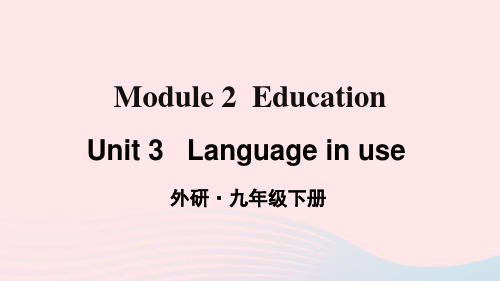
There must be someone outside.
Would you like something to drink?
③当形容词或else修饰复合不定代词时,形容词或 else必须放在复合不定代词之后。 Fresh water is more important than anything else.
of be afraid of... 害怕……; be full of... 充满…… to be similar to与……相似; be friendly to对……友好
be busy with… 忙于……; be angry with with 生……的气; be strict with 对……要求严格的
(1)人称代词主格形式一般在句中作主语。 They are standing in rows. 主语
(2)人称代词宾格形式一般在句中作宾语或表语。 You can trust him. 宾语 It’s me. 表语
注意
①I无论何时都要大写。在口语中有时使用I的宾 格形式作主语。 —I like this tie. —Me too. ②作并列主语时的顺序: 单数人称代词:第二人称→第三人称→第一人称 复数人称代词:第一人称→第二人称→第三人称
and prepositions. 2. Learn about home schooling. 3. Love our school and form the habit of reading.
Free talk
1. How do you go to school? 2. When does the first class begin? 3. How many lessons are there in the morning? 4. What do you usually do on weekends?
外研版英语九下《Module_2_Education》(Unit_3)
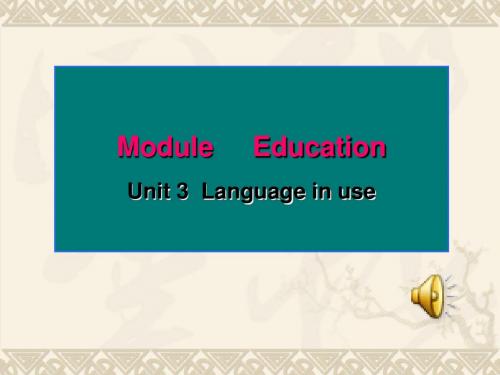
Around the world: Home schooling
Educating their children at home instead of sending them to school
As many as 150,000 children in the UK alone Why? Benefit from …
Complete the conversation with the correct words and expressions.
Anna: Hi,Bob. How did your exams go last term? Bob:Great! I got good marks in (1) both / each maths or geography. What about you? Anna: I did really well in English. That’s (2) anything / something I’ve always enjoyed. My marks in history and art weren’t so good, because (3) none / neither is my favorite subject. What will you study this term?
Complete the conversation with the correct words and expressions.
Bob: I’ve still got (4) a few / few days before I have to decide. I’m going to speak to (5) every / all my teachers and ask for their advice. Anna: The teachers say that we must decide for (6) themselves / ourselves, that (7) none / neither of them can tell us what to do. Bob: But I have to get (8) some / any information because there are so (9) much / many subjects and it’s very hard to choose.
春九年级英语下册 Module 2 Education Unit 3 Language in use

Unit3 Languageinuse基础知识回顾Ⅰ.根据句意用适当的介词填空1.These days I am busy with my project on pollution.2.My teacher was very angry with me because I was late for school again.3.Will you invite any friends to your thirteenth birthday party?4.How long has he worked as an English teacher?5.My uncle arrived at the train station on the morning of May 3.Ⅱ.用方框中所给单词的适当形式填空1.I did well in both English and Chinese last term.2.—What would you like,tea or coffee?—Neither .I’d just like a glass of water.3.—Can I use your pen,Kate?—OK.Here you are.But you can’t lend it to others.4.I tried several skirts on,but none of them looked good.5.Good news!We won first prize in the singing petition.Ⅲ.根据汉语意思完成句子,每空一词1.在帕克学校没有人学习汉语。
No one learns Chinese in Park School.2.午饭休息时间从12点到1点。
The lunch time is from 12:00 pm to 1:00 pm.3.课刚开始时,老师给我们讲了一个故事。
九年级英语下册Module2EducationUnit3Languageinuse课件新版外研版

Rowling is __h_e_r__(she) favorite writer.
3. [2023·株洲中考改编] Although the storm broke many
things apart, it brought __u_s___(we) closer together.
返回
目录
二、选用适当的词填空。 4. We go to school every weekday( 工作日)__f_ro_m____
返回 目录
三、单项选择。 9. This isn’t my schoolbag. ___C___ is over there.
A. His B. Hers C. Mine D. Yours
返回 目录
10. [2023·石家庄月考] Excuse me, do you have a book
___B___ American history?
返回 目录
8: 45 am ____to____ 3:15 pm.
返回 目录
5. All the students have gone to the science museum _e_x_c_e_p_t__ Tom, because he is ill.
返回 目录
6. This is a classical photo where there is a big bridge ___o_v_e_r__ the river.
返回 目录
Another thing you can do is be kind to yourself. Treating yourself kindly is 22.__h_e_lp_f_u_l__ (help).
九年级英语下册Module2EducationUnit3Languageinuse课件新版外研版

Presentation
• I took them myself. • So ours is a bit bigger. • Everyone is wearing a jacket and tie! • We go to school every weekday from 8:45 am to 3:15 pm. • We have a large sports ground for football and tennis, where we can play both during and after school hours.
Presentation
二、指示代词
指示代词有下面四个:
this that these those
指示代词在句中可作: 1) 主语 e.g. These are our children. 2) 宾语或介词宾语 e.g. Tom gave me this. 3) 偶尔用作表语 e.g. What I want to stress is this.
Presentation
五、疑问代词
疑问代词有下面这些:
who whom whose what which
1. who 在句中多用作主语或表语。 2. whom 在句中用作宾语或介词的宾语。 3. whose 表示 “谁的”,可用作定语、主语、 表语及宾语。
4. what 和 which 都可在句中用作主语、宾语 或介词的宾语以及定语。what 还可用作表语。
Presentation
六、常用的不定代词
初中英语外研版九年级下册《Module 2 Education Unit 3 Language in
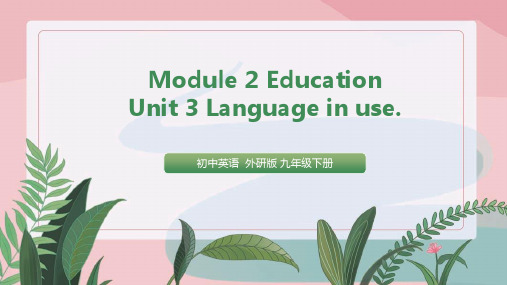
3. — Jane is doing a project about family
historSyh. e
her
o__u_r__ has asked us to give _____ some of _____ photoswtheat were taken when we
were
us
young. Have _____ got any, Becky?
(202X 黔南州)
---Are Kate and Joan_____good friends?
---Yes,they are.Please look after_____.
A.your;their B.your;them
C.yours;theirs
D.you;them
介词
in on at of by from
between…and… over under the bed along the river under behind the chair
above the box
be good for
全国英语中考试题
(202X柳州)
1.Li Ying cleans her room_______the week
A.your,me B.you,me C.you,I
(202X 荆门)
---Do you know who taught_______French?
---Nobody.He learned it by_______.
A.his;himself
B.him;him
C.him;himself
D.his;him
end.
A(2.0a2tX孝感) B. for
- 1、下载文档前请自行甄别文档内容的完整性,平台不提供额外的编辑、内容补充、找答案等附加服务。
- 2、"仅部分预览"的文档,不可在线预览部分如存在完整性等问题,可反馈申请退款(可完整预览的文档不适用该条件!)。
- 3、如文档侵犯您的权益,请联系客服反馈,我们会尽快为您处理(人工客服工作时间:9:00-18:30)。
Unit 3 Language in use
Ⅰ. 从括号中选出适当的代词完成句子。
1. Who will teach _____ (us our) English this term? Is _____ (it of ______ (theirs them).
3. Every day Mr Li checks ______ (our us) a ’t worry. You can , but neither of them looked good on me. ___________
4. He feels lonely because ’t try to ’t. ___________
7. —Would you like chicken noodles or beef noodles?
—Either. I like noodles with vegetables in them. ___________
8. Both of the girls comes from the USA. ___________
9. None of the student were very borrow any of
them. ___________
Ⅲ.根据汉语意思翻译下面的句子(每空一词)。
1. 他擅长讲故事。
He ______ ______ ______ telling stories.
2. 妈妈们总是要求她们的小孩将玩具收好。
Mothers always ask their children to ______ ______ their toys.
3. 当我们遇到困难的时候可以请求帮助。
We can _______ _______ we’re in trouble.
4. 山羊奶制成的奶酪非常可口。
除此之外,山羊还是一种友好的动物。
Cheese made from goats’ milk is very tasty. _______ _______, goats are friendly animals.
5. 等我写完这封信,好吗?
_______ _______ me to finish the letter, will you?
1。
